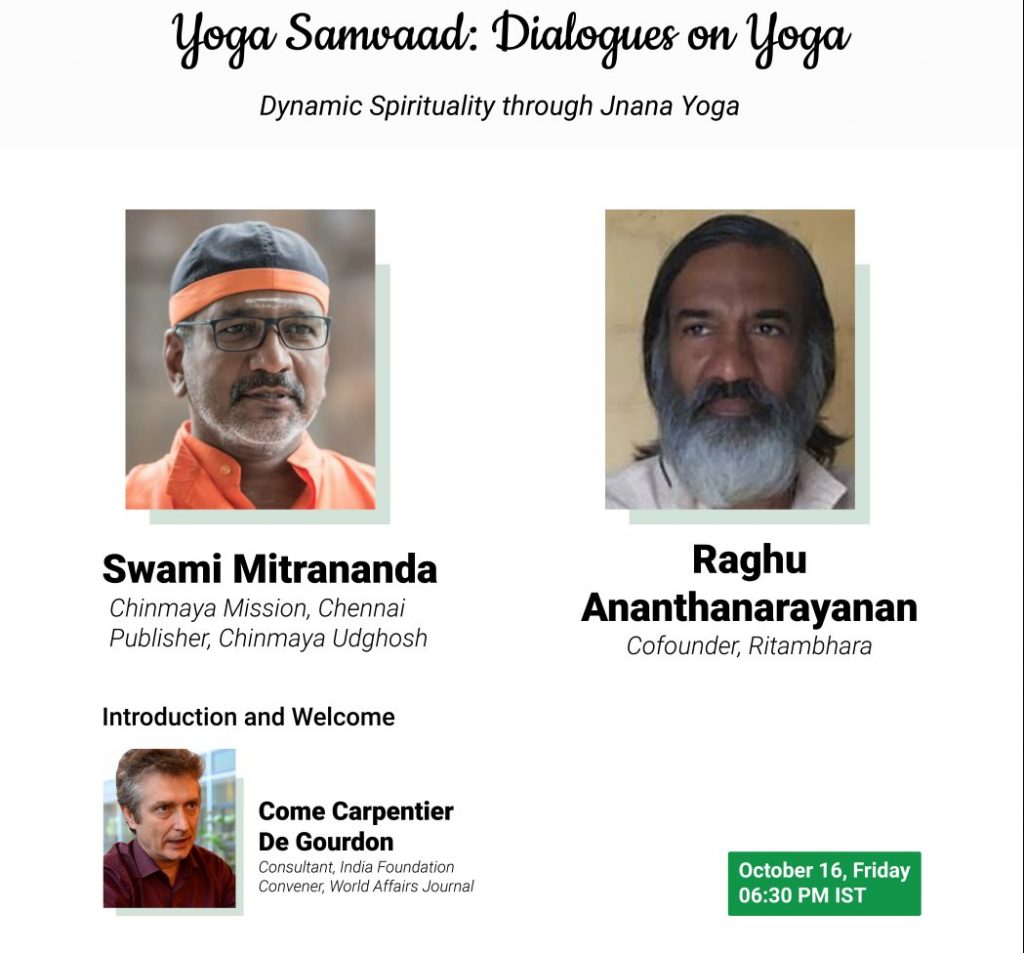Yoga Samvād with Swami Mitrananda
Yoga Samvād – Dialogues on Yoga, a collaboration between Ritambhara and India Foundation’s Center for Public Diplomacy & Soft Power (CPDSP), resumed with an inspiring and insightful dialogue between Swami Mitrananda (Chinmaya Mission, Chennai), Sri Raghu Ananthanarayanan (Chief Mentor – Ritambhara), Sri Come Carpentier De Gourdon (Consultant, India Foundation & Convenor, World Affairs Journal). The theme of the dialogue was ‘Dynamic Spirituality Through Jñāna Yoga’.
Swami Mitrananda is a dynamic and inspiring monk from Chinmaya Mission who has worked with youth extensively. He is renowned for bringing the knowledge of Vedanta and Bhagavad Gita to the youth through innovative ways. Sri Raghu Ananthanarayanan is the co-founder and chief mentor of Ritambhara. He studied yoga under Yoga Acharya Sri T Krishnamacharya and has been teaching Yogasutras over the past many decades. Raghu and his wife Sashikala Ananth designed a unique framework of inner unfoldment called SaptaSwara which draws inspiration from seven key ideas from Yogasutras, Natya Shastra, and Vastu Shilpa Shastra that talk about Antaranga Sadhana. Yoga Samvād series explores the ideas in SaptaSwara through dialogue sessions with experts from diverse fields. Sri Come Carpentier moderated the dialogue session.
The session began with Come introducing both the speakers followed by a brief introduction of the SaptaSwara framework by Raghu. He underlined the importance of Antaranga Yoga Sadhana in today’s context where asana and pranayama have gained prominence to an extent where they are even distorted. Asana and pranayama refers to Bahiranga Yoga and then one transitions to Antaranga Yoga where one cleanse one’s psyche through which the mind becomes capable of ekagrata (single pointed focus). Yoga Acharya Sri T Krishnamacharya used to say that without this important transition of the mind of an individual to one that is capable of ekagrata, him/her talking of areas which are referred to as Parama Antaranga Yoga (states of samadhi, etc.) becomes vikalpa. He shared that at Ritambhara we focus largely on Antaranga Yoga which deal with this transition of mind. The seven swaras that constitute SaptaSwara are:
- Maitri – understanding friendship and compassion both for yourself and others.
- Karma – intensity and acting with full emotional power one has
- Dharma – when I act, can I act in a way that I can enliven myself, others and the context.
- Jnana – deep understanding and insight into what I am trying to understand or know.
- Ramyam – beauty and inner delight
- Yogam – integration of all our energies into a mindful focus
- Abhyasam – how to apply these in daily living
Raghu concluded by stating that the SaptaSwaras enables a person to live a rasatmik life where a person can live life experiencing all the different rasas fully.
Swami Mitranandaji began by stating that the most abused word in recent times is yoga and meditation. Swami-ji talked of the root of the word ‘yoga’ as being from ‘yuj’ which means union of jivātma with paramātma, when the human realizes his or her own divinity.
Swami Mitrananda elaborated on how Sri Krishna urges Arjuna to become a yogi (‘Tasmāt yogi bhava Arjuna.”). He then shared two definitions of yoga in Bhagavad Gita.
samatvam yoga uchyate (BG 2.48) – A mind which is balanced is in yoga. What comes to us in life that we do not like will not stay forever. Same way what comes into the life that we like will also not stay forever. Therefore, Krishna asks Arjuna to keep the mind balanced in all the dwandās that come to us in life such as joy and sorrow, heat and cold, etc. Swami-ji shared how Sri Ram demonstrated the mind of a yogi through his responses to the invitation for the coronation and soon after while hearing the news of exile in the forest. Following this Mitrananda-ji talked about how we can attain this balance of mind to be established in yoga. He underscored the importance of having a higher vision of life for an individual to live a yogic life. A higher vision helps one maintain balance in the face of challenges in life.
yoga: karmasu kaushalam (BG 2.50) – Dexterity, skill in action that is performed is yoga. Any action that is performed skillfully is yoga. If mind runs away to the future in anxiety or goes back to something in the past, the action cannot be skilful. To be skilful in action, mind and body should be in the same place.
Swami-ji referred to how serving tea is Zen practice in Japan. He shared a beautiful snippet from Ramayana on how the way Hanuman introduced himself to Sri Ram exemplifies the spirit of yoga. Swami-ji quoted a story from the ‘Gospels of Sri Ramakrishna’ which talks of how watching Sri Ramakrishna folding a shawl his disciple M went into samādhi.
Following this, Swami-ji outlined the principles of Karma Yoga:
- Dedicate the action to the Lord. The sense of dedication will enable one to perform the action in the best possible manner.
- Whatever is the outcome of the action, do not be attached to it. A yogi will gracefully accept whatever outcome come out of his or her actions.
- To the very action, do not be attached. – Do not become attached to the action itself.
A yogi is one who will continuously improve the quality of his or her own actions. The action then becomes close to perfection (siddhis). Excellence is the habit of a yogi.
Swami-ji concluded his talk by inviting everyone to develop excellence as a habit empowered by yoga. He urged everyone to take up five activities from daily life and pursue excellence in it over the next three weeks. Once we can develop excellence in five activities, it can be slowly extended to more activities.
The talk was followed by a question and answer session between Sri Raghu Anantharanayanan and Swami Mitrananda on topics relating to knowledge (para and apara vidya), how to learn in a way the knowledge becomes an embodied experience, dharma and satya, etc. You can watch the full dialogue here.
Next Yoga Samvād will be on 20th November 2020. Register here to receive the invitation to join the dialogue.



 Priya is a Yoga therapist in the Krishnamacharya tradition. She adapts Reiki & energy work, Vedic chanting, life coaching & Ayurvedic practices in her healing spaces. She is committed to nurturing collectives that have the praxis of Yoga at their heart.
Priya is a Yoga therapist in the Krishnamacharya tradition. She adapts Reiki & energy work, Vedic chanting, life coaching & Ayurvedic practices in her healing spaces. She is committed to nurturing collectives that have the praxis of Yoga at their heart. Anisha has been on an exploration to understand herself through yoga for the last 15years which led her to teaching yoga, yoga therapy and inner work through yoga.
Anisha has been on an exploration to understand herself through yoga for the last 15years which led her to teaching yoga, yoga therapy and inner work through yoga. Apoorva chanced upon Yoga in her early 20s. A spark was lit within and there was no turning back. Her exploration led her to the Krishnamacharya tradition more than a decade ago. Curious about human behaviour and what drives it, she was thrilled when her search ended (and also began) when she first came upon the Yoga Sutra, which illuminated a path towards answering many questions that had been held for a long time.
Apoorva chanced upon Yoga in her early 20s. A spark was lit within and there was no turning back. Her exploration led her to the Krishnamacharya tradition more than a decade ago. Curious about human behaviour and what drives it, she was thrilled when her search ended (and also began) when she first came upon the Yoga Sutra, which illuminated a path towards answering many questions that had been held for a long time. Anita is a yoga teacher and therapist in the tradition of Sri.T.Krishnamacarya and Sri T.K.V. Desikachar, a Reiki practitioner and a Life Coach. She is also the founder of Vishoka, a center for learning Indic and energy-based frameworks for living and healing. Her deep concern for human suffering and the problems of unsustainable living kept her on the path of seeking an integrated approach to looking at life, living, learning and healing.
Anita is a yoga teacher and therapist in the tradition of Sri.T.Krishnamacarya and Sri T.K.V. Desikachar, a Reiki practitioner and a Life Coach. She is also the founder of Vishoka, a center for learning Indic and energy-based frameworks for living and healing. Her deep concern for human suffering and the problems of unsustainable living kept her on the path of seeking an integrated approach to looking at life, living, learning and healing. Ankit is a seeker in the wisdom traditions of India. The core of his work includes creating dialogic spaces where people can look within and see the connection between their inner and outer lives. Inspired by the likes of Gandhi, Aurobindo, Vivekananda and Guru Gobind his experiments in service took him back to his roots in Punjab where he is creating a community-led model of higher education which is open, inclusive and accessible for all. Ritambhara for him is a space for engaging in a community which is committed to a DHramic life. He anchors his work of learning and leadership in the Antaranga Yoga Sadhana and the humanistic wisdom of Mahabharata.
Ankit is a seeker in the wisdom traditions of India. The core of his work includes creating dialogic spaces where people can look within and see the connection between their inner and outer lives. Inspired by the likes of Gandhi, Aurobindo, Vivekananda and Guru Gobind his experiments in service took him back to his roots in Punjab where he is creating a community-led model of higher education which is open, inclusive and accessible for all. Ritambhara for him is a space for engaging in a community which is committed to a DHramic life. He anchors his work of learning and leadership in the Antaranga Yoga Sadhana and the humanistic wisdom of Mahabharata.